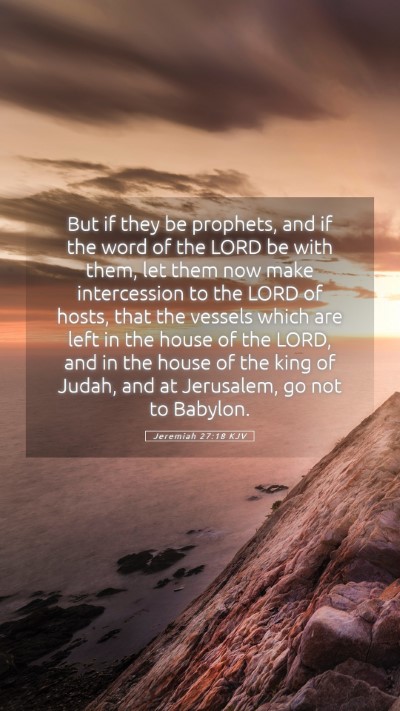Bible Verse Commentary: Jeremiah 27:18
Verse: "But if they be prophets, and if the word of the Lord be with them, let them now make intercession to the Lord of hosts, that the vessels which are left in the house of the Lord, and in the house of the king of Judah, and at Jerusalem, go not to Babylon." (Jeremiah 27:18)
This verse is rich in meaning and provides a dramatic backdrop to the broader narrative found in the Book of Jeremiah. A careful analysis reveals layers of biblical insight that pertain to prophecies, the nature of God's judgment, and the importance of intercession in prayer.
Understanding the Historical Context
In the time of Jeremiah, the kingdom of Judah was under the threat of Babylonian conquest. The prophet Jeremiah warned the people about the inevitability of this impending judgment due to their persistent disobedience to God. Surrounding this verse is the context of false prophets who claim to speak for God yet offer misleading encouragement to the people.
Meaning of Bible Verses: Insights from Public Domain Commentaries
-
Matthew Henry's Commentary:
Henry emphasizes the significance of true prophecy and the urgency of prayer. He highlights that if the prophets are indeed speaking God's truth, they must take serious action in prayer to prevent the destruction of the holy vessels. This serves as a reminder that true ministry must involve pleading with God on behalf of the nation.
-
Albert Barnes' Commentary:
Barnes elucidates that the reference to "vessels" indicates the sacred articles from the temple, signifying holiness. He points out that these items are symbolic of God's presence among His people and their preservation is linked to the fidelity of the prophets and their intercession.
-
Adam Clarke's Commentary:
Clarke draws attention to the emphasis on "let them now make intercession." He suggests that genuine prophets should take their role as intercessors seriously amidst challenges. Clarke notes this call to prayer underscores the relationship dynamics between God and His people, where they must actively engage in seeking mercy and intervention.
Scriptural Analysis: The Call to Intercession
Jeremiah 27:18 not only underscores the plight of the people but also highlights the profound role of intercessors in biblical narrative. This verse calls into question the authenticity of prophetic voices; it challenges their claims and insists they demonstrate tangible faith through prayer. The act of making intercession reflects the depth of God's mercy amidst judgment.
Biblical Exegesis: Intercessors and Their Role in Prayer
The function of prophets as intercessors illustrates a key theme in the broader biblical context: the necessity of standing in the gap for others. Prophets were to serve as mediators, calling God’s attention to their plight while seeking His intervention. Jeremiah's directive emphasizes that true prophecy must be coupled with fervent prayer, symbolizing a living faith through action.
Application of Bible Verses to Daily Life
In our daily lives, this passage challenges believers to consider their role in interceding for others. How do we stand for our communities, families, and nations? It serves as a reminder that our prayers have power and significance. The call to genuine communication with God and the importance of aligning our prayers with God's will are pivotal lessons drawn from this verse.
Connecting Themes in Scripture
Jeremiah 27:18 resonates with several other Bible passages:
- Ezekiel 22:30: “And I sought for a man among them, that should make up the hedge, and stand in the gap before me for the land, that I should not destroy it: but I found none.”
- 1 Timothy 2:1: “I exhort therefore, that, first of all, supplications, prayers, intercessions, and giving of thanks, be made for all men.”
- Romans 8:26-27: “Likewise the Spirit also helpeth our infirmities: for we know not what we should pray for as we ought: but the Spirit itself maketh intercession for us with groanings which cannot be uttered.”
Conclusion: The Importance of True Prophecy and Intercession
Jeremiah 27:18 is a powerful reminder of the weight that rests on the shoulders of those who claim to speak for God. The blend of prophetic call and the necessity for intercessory prayer holds profound implications for both historical and modern believers. Understanding this verse in its context fosters deeper Bible study insights and enriches our Bible study lessons, allowing us to grasp the importance of standing firm in prayer amidst trials and tribulations.


